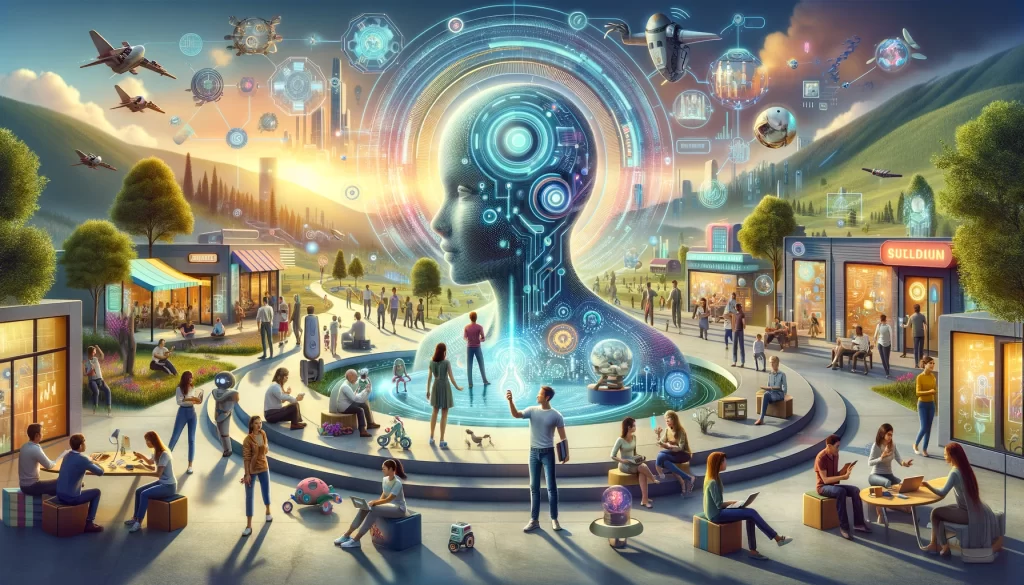In the heart of our journey with artificial intelligence, we’re somewhat standing at a crossroads. Some react with excitement, others with fear. Why so?
These two opposite reactions that we are witnessing at an individual, organizational, and institutional level aren’t random. Analyzing the current scenario from a behavioral and psychological approach can help explain why.
Understanding the process of AI adoption as a matter of venturing into the unknown -rather than into AI itself- contributes to shed some light on our current societal experience with AI.
Understanding the process of AI adoption as a matter of venturing into the unknown -rather than into AI itself- helps understand what we are experiencing with AI as a society, at present.
When we find out about something impactful that we didn’t know about, we react either with fear or excitement, which explains the opposite reactions we have been witnessing in the last year and a half regarding AI at all levels.
More in particular, when this “something” to which we react is perceived as a threat, we experience fear. Fear is an emotional response to a perceived threat or danger. If we perceive AI as a threat or as a danger, it is normal to experience fear.
In turn, reacting with fear generally leads to rejection of the perceived threat, in this case, of AI.
In this regard, differentiating between fear, as an emotional response, and risk awareness is critical to make informed decisions regarding AI, foster an empowering AI mindset, and ensure a healthy human-AI co-existence.
To clarify, saying that we need to distinguish whether our reasoning and conclusions about AI stem from fear or from an objective assessment of its risks is not the same as claiming that AI doesn’t have risks. As many other technologies, AI has risks, and it’s important to address them.
Also, saying that fear generally leads to rejection is not the same as saying that if we evaluate AI without fear we will accept it. After a thorough unbiased assessment, one might still decide to reject AI, should they conclude it’s the best option.
The aim is neither to trivialize the fear associated with AI, minimize its risks, or convince anyone to accept AI. What I am trying to underline is the importance of making evaluations and decisions about AI from a position of empowerment, rather than from a standpoint of fear.
Differentiating between fear and risk awareness is vital to foster an empowering AI mindset

If AI has risks, why shouldn't we be afraid?
Precisely because AI has risks (but also opportunities), it’s important to make the distinction between risk and fear, as a fear-free mindset enables a more balanced evaluation of potential risks and opportunities, fostering an informed perspective.
Let me explain this difference further with an example.
If someone tells you: ‘You shouldn’t drive with fear’, you would rarely interpret it in the direction of ‘you should not be cautious when driving’. Both you and this person know that driving has objective risks (we only have to look at the stats of traffic accidents). The reason you should’t drive with fear is not because driving doesn’t have risks, but precisely because of the opposite. Fear can interfere with your cognitive abilities and put you in a situation of even more risk. If you drive without fear, you might be able to evaluate the real risks and opportunities regarding when to pass a car more objectively.
With AI, we have a similar situation. Whenever I say you shouldn’t approach AI with fear I am not saying you shouldn’t be cautious about AI. Fear is a psychological reaction whereas risk assessment is (or should) be based on objective data. Risk assessment is useful to help us take an informed decision but fear can just distort our capacity to evaluate AI from a non-biased approach.
If someone tells you ‘You shouldn’t drive with fear’, you would rarely interpret it in the direction of ‘you should not be cautious when driving’. With AI, we have a similar situation.
The Importance of Psychological Readiness
In the current landscape of AI democratization, psychological preparedness is becoming a key determinant of competitive advantage. This factor is now overshadowing traditional advantages such as technical expertise, geographical location, or financial resources.
Psychological factors such as unconscious biases play a significant role in how we perceive emerging technologies, and our willingness to adopt them. When fear governs our approach to AI, it can lead to our rejection, therefore putting us in a situation of competitive disadvantage.
Psychological readiness will be a key asset for our competitive advantage at an individual and organizational level in the immediate future.
Fostering an Empowered Collective AI Mindset
Achieving a healthy human-AI co-existence is all about fostering an empowered AI mindset.
Our goal as a society should be to create a landscape where AI empowers, rather than overwhelms, scares, or replaces, fostering a harmonious co-existence in which AI is embraced as a tool that amplifies human potential and aligns with our broader societal objectives.
Importantly, an empowered AI mindset isn’t about pushing everyone to jump on the AI bandwagon. It’s about making sure we all feel ready and prepared to make our own choices about AI.
Strategic Imperatives for an AI-Enabled Future
As we progress, it’s imperative for private and public organizations to integrate psychological preparation into their AI training efforts beyond AI’s functionalities and technicalities. Such an approach will enable individuals and organizations to foster and contribute to achieve a healthy and empowering culture of AI for the organization and the society.
This article was originally published by Dr.Laura as a LinkedIn article
